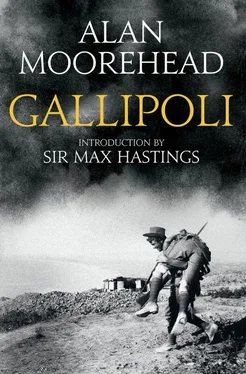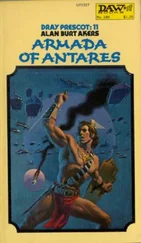There were other worries which were no less serious. The security position was almost entirely out of hand. Greek trading caiques were noting every preparation in the islands and carrying the news back to enemy agents in Athens. Letters were arriving in Alexandria by the ordinary post from England marked, ‘Constantinople Force, Egypt’. And the Egyptian Gazette in Cairo not only announced the arrival of each new contingent but openly discussed the chances of the expedition at the Dardanelles. Hamilton protested in vain; he was told that since Egypt was a neutral country the British authorities could not interfere with the newspapers. The best therefore that could be hoped was that the Turks would regard all this publicity as an elaborate bluff, and Intelligence was instructed to spread a rumour through the Near East that the actual landing would be made at Smyrna.
All this was very depressing. But Kitchener had said that the attempt must be made, and so there could be no question of turning back. In the first week of April, therefore, Hamilton and his staff set about drawing up their plans at their headquarters in the Metropole Hotel in Alexandria. Even if they had faltered — and Hamilton seems to have been at his best during these days, patient, optimistic and extremely energetic — there now began to grow up around him an atmosphere that made it all the more imperative for him to go on. The expedition began to develop a life of its own. However gloomy the commanders might be, a communal will for action had spread itself through the Army. The men were eager to be off, and it was becoming perfectly clear that they would go into the first assault with great determination. The very sight of the ships gathering in Alexandria harbour, the hammerings in the workshops, the long lines of marching men in the desert, the heavy booming of the artillery at practice — all these things seemed to make it inevitable that they must go forward, and that once they attacked they were bound to win. This auto-suggestion, this mass-will towards adventure, presently began to take effect upon the generals. As the date of the assault grew nearer their earlier misgivings were swallowed up in the practical and stimulating work of getting the Army ready to fight. D’Amade, the French commander, drops his ideas on Asia. Birdwood is now sure that he can get his Australians and New Zealanders ashore. Paris sees chances he overlooked before. And Hunter-Weston, having studied the maps and the forces, declares that his earlier appreciation was wrong — the thing is very possible and he particularly likes the role that he himself is to play.
By April 8 Hamilton judged that the arrangements were moving forward at a sufficient pace to enable him to get away and place his plan before de Robeck and the Admirals. The Arcadian , a liner which normally made pleasure cruises to the Norwegian fjords, had been fitted up as a headquarters ship, and in her he sailed for Lemnos. He arrived in Mudros Harbour on April 10, and at once proceeded to his vital conference with the admirals aboard the Queen Elizabeth .
Hamilton’s plan, though complicated in its details, amounted to a simple assault upon the Gallipoli peninsula itself. The main striking force was to be his best division, the British 29th, under Hunter-Weston. It was to go ashore on five small beaches at Cape Helles at the extreme tip of the peninsula, and it was hoped that by the end of the first day the crest of Achi Baba, six miles inland, would be in its hands. Meanwhile Birdwood was to land with the Anzac Force about thirteen miles up the coast between Gaba Tepe and Fisherman’s Hut. Striking across the peninsula through the Sari Bair hills he was to make for Mal Tepe — the mountain on which Xerxes is supposed to have sat while he reviewed his fleet in the Hellespont. Thus the Turks fighting Hunter-Weston at Cape Helles would be cut off in their rear, and the hills dominating the Narrows would be overcome.
Simultaneously, two main diversions were to be carried out. The Royal Naval Division was to make a pretence at landing at the neck at Bulair, and the French were to go ashore for a large armed raid on Kum Kale on the Asiatic side of the Straits. Later these two forces would be brought back to Cape Helles and put into the main attack. By the second or the third day it was hoped that the lower half of the peninsula would be so overrun that the Fleet with its minesweepers could safely pass through the Narrows into the Sea of Marmara.
De Robeck, Wemyss and Keyes were delighted with this plan. They agreed with Hamilton that he was right in rejecting Bulair. It was much too dangerous, despite all its attractions. Directly the Army advanced inland it would lose the support of the naval guns and expose itself to attack on both its flanks — one Turkish army coming down from Thrace and another coming up from Gallipoli. There was also the possibility that Bulgaria might declare war and threaten Hamilton in his rear. The same kind of difficulties would apply if the Allies made their main assault in Asia.
On the peninsula itself no beach was large enough to allow the Army to concentrate for one hammer blow, but the Fleet would be there to cover the assault at every point, and in any case there was a certain virtue in dispersal: Liman von Sanders would get reports of landings from half a dozen different places at once, and for the first twenty-four hours at least he would not know which was the main one. Therefore he would hold back his reserves until the Allies were securely ashore.
There was to be one important refinement of the plan, and this was a stratagem put forward by a Commander Unwin, who seems to have been inspired by the story of the wooden horse at the siege of Troy. He proposed to secrete 2,000 men in an innocent looking collier, the River Clyde , and run her aground at Cape Helles. Directly she touched, a steam hopper and two lighters were to be brought round to her bows and lashed together to form a bridge to the shore. The men would then issue from two sallyports which were to be cut in the ship’s sides. Running along two gangplanks to a platform at the ship’s bows, they would drop on to the bridge and make their way to the beach. It was hoped in this way to empty the ship within a few minutes. In addition, machine guns were to be mounted behind sandbags in the bows, and these were to hold the enemy down while the disembarkation was taking place.
The Navy indeed had been extremely busy with a number of such devices and improvisations. Quite apart from Keyes’ new fleet of destroyer-minesweepers which was now ready, three dummy battleships had arrived. These were ordinary merchantmen enlarged and disguised with wooden guns and superstructure. From a distance the silhouette they presented was exactly that of a battleship, and it was hoped that their presence here in the Ægean might induce the German Fleet to come out and fight in the North Sea. [10] One of them was subsequently torpedoed by a U-boat near Malta, and must have occasioned some surprise to the Germans. As the ship settled her wooden turrets and her 12-inch guns floated away on the tide.
Air Commodore Samson was now established on Tenedos, and the seaplane carrier Ark Royal had joined the Fleet. Samson’s difficulties had been almost crippling. When his thirty aircraft were uncrated only five were found to be serviceable, and their equipment was not such as to inspire confidence. Bombs were either released from a primitive rack under the pilot’s feet or simply flung overboard by the observer once the safety tabs had been removed. No machine-guns had been fitted at this stage, but instead, there was available a supply of iron spikes; these the pilot or the observer could aim at such of the enemy who appeared below, rather in the manner of a hunter spearing a bear. Although these spikes emitted an unpleasant whirring noise as they descended, and no doubt created a feeling of extreme insecurity among the infantry below, they seldom hit anything. For the rest, Samson’s pilots carried a revolver, binoculars and a lifebelt or an empty petrol can to hold on to in case they fell into the sea. The observers were equipped with a rifle, charts and a watch.
Читать дальше












